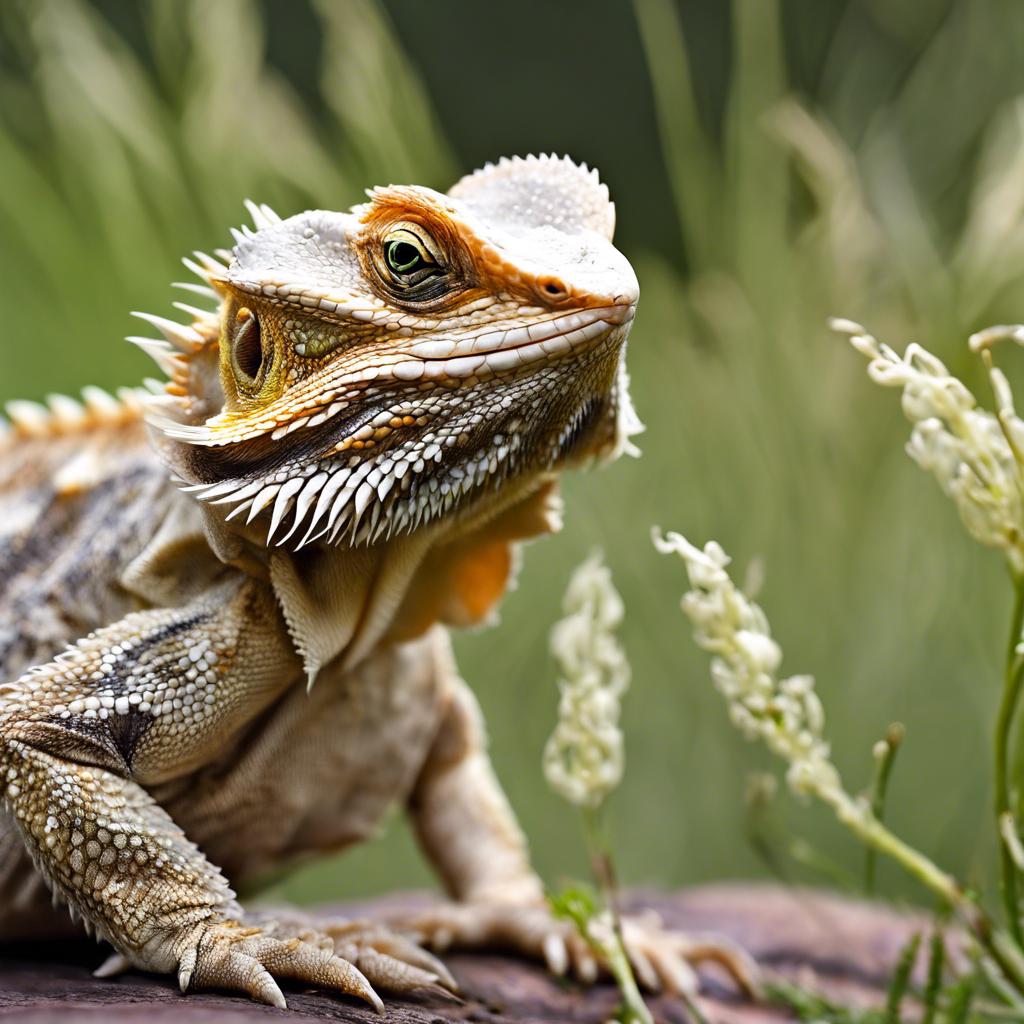Feeding a balanced diet to bearded dragons is crucial for their overall health and well-being. These reptiles require a variety of nutrients to thrive, and providing them with a diverse range of foods is essential. One vegetable that can be included in a bearded dragon's diet is fennel. Fennel is not only flavorful but also packed with nutrients that can benefit these pets. In this article, we will explore the nutritional value of fennel for bearded dragons, how to prepare it for them, how much they should eat, and the benefits and risks associated with feeding fennel to these reptiles.
Key Takeaways
- Fennel is a nutritious vegetable that can be fed to bearded dragons.
- Fennel should be prepared by washing and chopping it into small pieces.
- Bearded dragons should only eat fennel as a treat and not as a staple diet.
- Feeding fennel to bearded dragons can improve digestion and provide essential vitamins and minerals.
- It is important to provide a balanced diet for bearded dragons and offer a variety of vegetables as alternatives to fennel.
Nutritional Value of Fennel for Bearded Dragons
Fennel is a highly nutritious vegetable that can provide several essential nutrients for bearded dragons. It is rich in vitamins A and C, which are important for maintaining healthy skin, eyesight, and immune function in these pets. Fennel also contains minerals such as calcium, potassium, and magnesium, which are necessary for proper bone development and muscle function.
Additionally, fennel is a good source of dietary fiber, which aids in digestion and helps prevent constipation in bearded dragons. It also contains antioxidants that can help protect against oxidative stress and inflammation. Overall, the nutritional profile of fennel makes it a valuable addition to a bearded dragon's diet.
Preparing Fennel for Bearded Dragons
Before feeding fennel to your bearded dragon, it is important to properly clean and chop it. Start by washing the fennel thoroughly under running water to remove any dirt or debris. Next, remove the tough outer layer of the bulb and discard it. Chop the fennel into small pieces that are easy for your pet to eat.
It is crucial to remove any parts of the fennel that may be harmful to bearded dragons. This includes the leaves, as they can be difficult for these reptiles to digest. Additionally, the fennel stalks should be chopped into small pieces to prevent choking hazards. By properly preparing fennel, you can ensure that it is safe and easy for your bearded dragon to consume.
How Much Fennel Should Bearded Dragons Eat?
While fennel can be a nutritious addition to a bearded dragon's diet, it should not be the sole component. These reptiles require a balanced diet that includes a variety of vegetables and protein sources. Fennel should make up only a small portion of their overall diet.
A general guideline is to offer fennel to bearded dragons once or twice a week. The amount of fennel to feed them depends on their size and age. For adult bearded dragons, a few small pieces of fennel per feeding is sufficient. For younger dragons, start with smaller amounts and gradually increase as they grow.
It is important to balance fennel with other vegetables and protein sources to ensure that your bearded dragon receives all the necessary nutrients. Variety is key when it comes to their diet, so rotate different vegetables and protein sources regularly.
Can Fennel Be a Bearded Dragon's Staple Diet?
While fennel is a nutritious vegetable, it should not be the main component of a bearded dragon's diet. These reptiles require a diverse range of foods to meet their nutritional needs. Fennel can be included as part of their vegetable rotation, but it should not replace other essential vegetables and protein sources.
Bearded dragons need a variety of leafy greens such as collard greens, mustard greens, and dandelion greens. These provide important vitamins and minerals that are necessary for their overall health. Additionally, they require protein sources such as insects (crickets, mealworms) or commercial reptile pellets to meet their dietary requirements.
By providing a balanced diet that includes a variety of vegetables and protein sources, you can ensure that your bearded dragon receives all the necessary nutrients for optimal health.
Benefits of Feeding Fennel to Bearded Dragons

Feeding fennel to bearded dragons can offer several benefits for their health and well-being. The high vitamin A content in fennel promotes healthy skin and eyesight in these reptiles. It also supports their immune system, helping them fight off infections and diseases.
The fiber content in fennel aids in digestion and can help prevent constipation, a common issue in bearded dragons. Additionally, the antioxidants found in fennel can help reduce inflammation and oxidative stress, promoting overall health.
Fennel also provides minerals such as calcium, potassium, and magnesium, which are essential for proper bone development and muscle function in bearded dragons. By including fennel in their diet, you can contribute to their overall health and well-being.
Risks of Feeding Fennel to Bearded Dragons
While fennel can be beneficial for bearded dragons, there are some potential risks associated with feeding it to these pets. One risk is the presence of pesticides or other chemicals on the fennel. It is important to choose organic fennel or thoroughly wash conventionally grown fennel to remove any potential contaminants.
Another risk is the choking hazard posed by large pieces of fennel stalks. Bearded dragons have small throats and can easily choke on large pieces of food. To mitigate this risk, always chop the fennel into small, manageable pieces before offering it to your pet.
Lastly, some bearded dragons may have individual sensitivities or allergies to certain foods, including fennel. If you notice any adverse reactions such as diarrhea or vomiting after feeding your pet fennel, discontinue its use and consult a veterinarian.
Alternative Vegetables for Bearded Dragons
In addition to fennel, there are several other vegetables that can be included in a bearded dragon's diet. These vegetables provide a variety of nutrients and flavors, ensuring that your pet receives a balanced diet. Some alternative vegetables to consider include:
1. Collard Greens: These leafy greens are rich in calcium and vitamin A, making them an excellent addition to a bearded dragon's diet.
2. Mustard Greens: Another nutritious leafy green, mustard greens provide vitamins A and C, as well as calcium and fiber.
3. Dandelion Greens: Dandelion greens are packed with vitamins A, C, and K, as well as calcium and iron. They also have diuretic properties that can help prevent kidney stones in bearded dragons.
4. Butternut Squash: This winter squash is high in vitamin A and provides a sweet flavor that many bearded dragons enjoy.
5. Bell Peppers: Bell peppers are a good source of vitamin C and provide a crunchy texture that can help keep your pet's teeth clean.
By incorporating these vegetables into your bearded dragon's diet, you can provide them with a diverse range of nutrients and flavors.
Bearded Dragon Care Tips
Proper nutrition is just one aspect of caring for bearded dragons. Here are some general tips to ensure the health and happiness of these pets:
1. Provide a suitable habitat: Bearded dragons require a spacious enclosure with proper lighting, heating, and humidity levels. Ensure that their habitat is set up correctly to mimic their natural environment.
2. Offer a variety of foods: In addition to vegetables, bearded dragons require protein sources such as insects or commercial reptile pellets. Offer a variety of foods to meet their nutritional needs.
3. Maintain proper hygiene: Clean your bearded dragon's enclosure regularly to prevent the buildup of bacteria and parasites. Also, ensure that their food and water dishes are clean and free from contaminants.
4. Monitor their health: Keep an eye on your bearded dragon's behavior, appetite, and appearance. Any changes in these areas could indicate an underlying health issue. If you notice anything unusual, consult a veterinarian.
5. Handle with care: Bearded dragons can be skittish and may become stressed if handled improperly. Always support their body when picking them up and avoid sudden movements or loud noises.
By following these care tips, you can provide a safe and comfortable environment for your bearded dragon.
Feeding fennel to bearded dragons can be a nutritious addition to their diet. Fennel is packed with vitamins, minerals, fiber, and antioxidants that can contribute to their overall health and well-being. However, it should not be the sole component of their diet. Bearded dragons require a balanced diet that includes a variety of vegetables and protein sources.
In addition to fennel, there are several other vegetables that can be included in a bearded dragon's diet. These vegetables provide different nutrients and flavors, ensuring that your pet receives a diverse range of foods.
By providing a balanced diet and following proper care tips, you can ensure the health and happiness of your bearded dragon. Remember to consult a veterinarian for specific dietary recommendations and any concerns regarding your pet's health.
If you're wondering whether bearded dragons can eat fennel, you might find the article “Can Bearded Dragons Eat Fennel?” on Reptile Wizard's blog interesting. This article explores the nutritional benefits and potential risks of feeding fennel to bearded dragons. To learn more about responsible reptile keeping and other topics related to bearded dragons, check out Reptile Wizard's blog section.
FAQs
What is fennel?
Fennel is a flowering plant species in the carrot family. It is commonly used as a herb in cooking and its bulb, leaves, and seeds are all edible.
Can bearded dragons eat fennel?
Yes, bearded dragons can eat fennel. It is safe for them to consume in moderation as part of a balanced diet.
What are the nutritional benefits of fennel for bearded dragons?
Fennel is a good source of vitamin C, potassium, and fiber. It also contains antioxidants and has anti-inflammatory properties.
How should fennel be prepared for bearded dragons?
Fennel should be washed thoroughly and chopped into small pieces before feeding it to bearded dragons. It can be served raw or cooked.
Can feeding bearded dragons too much fennel be harmful?
Feeding bearded dragons too much fennel can cause digestive issues such as diarrhea. It should be given in moderation as part of a varied diet.

